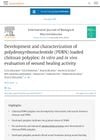 7 citations,
February 2022 in “Journal of Personalized Medicine”
7 citations,
February 2022 in “Journal of Personalized Medicine” Platelet-Rich Plasma therapy significantly increases hair density in people with Androgenic Alopecia, and works better with more treatments per month and in younger patients.
 7 citations,
March 2021 in “Evidence-based Complementary and Alternative Medicine”
7 citations,
March 2021 in “Evidence-based Complementary and Alternative Medicine” Nelumbinis Semen extract helps hair grow and could prevent hair loss.
 6 citations,
May 2023 in “European journal of pharmaceutical sciences”
6 citations,
May 2023 in “European journal of pharmaceutical sciences” Niosomes are the most effective at delivering drugs to the skin with minimal absorption into the body.
 3 citations,
June 2020 in “Cutis”
3 citations,
June 2020 in “Cutis” Poor nutrition can lead to skin diseases in hospitalized patients and should be quickly identified and treated.
 2 citations,
September 2023 in “Health science reports”
2 citations,
September 2023 in “Health science reports” People with certain skin conditions, especially androgenic alopecia, are more likely to have metabolic syndrome.
 2 citations,
January 2023 in “BioMed Research International”
2 citations,
January 2023 in “BioMed Research International” Beetroot extract nanogel may help treat hair loss caused by testosterone.
2 citations,
April 2022 in “Sleep and Breathing”  2 citations,
October 2021 in “Clinical Epidemiology and Global Health”
2 citations,
October 2021 in “Clinical Epidemiology and Global Health” High uric acid levels are more common in PCOS patients, especially those with androgenic PCOS, and are linked with increased cardiovascular risk and other metabolic issues.
1 citations,
January 2024 in “International journal of molecular sciences” MicroRNAs could be key biomarkers and therapeutic targets for PCOS.
 1 citations,
July 2023 in “Cosmetics”
1 citations,
July 2023 in “Cosmetics” The new shampoo effectively delivers caffeine to hair follicles to help keep hair, especially as people age.
1 citations,
April 2022 in “Applied sciences” Bitter melon extract may help prevent hair loss and can be used in cosmetic products.
 January 2025 in “Yonsei Medical Journal”
January 2025 in “Yonsei Medical Journal” Mastic gum and peppermint extracts may promote hair growth and health.
 December 2024 in “Molecules”
December 2024 in “Molecules” Bovine milk-derived exosomes may improve skin, hair, gut, brain, and bone health.

Drinking sweetened tea and soda and poor sleep may increase the risk of hair loss in women.
 November 2024 in “International Journal of Molecular Sciences”
November 2024 in “International Journal of Molecular Sciences” Nanoparticles may improve caffeine delivery for hair growth, offering a potential alternative to minoxidil for hair loss treatment.

Hair RiseTM microemulsion effectively promotes hair growth and treats hair loss better than standard treatments.
 July 2024 in “Periodontology 2000”
July 2024 in “Periodontology 2000” Autologous platelet concentrates show promise in esthetic treatments but need more standardized research.
March 2024 in “Nutrients” Alopecia Areata is linked to specific gut bacteria and metabolites, indicating a complex gut microbiome.
 March 2024 in “Healthcare”
March 2024 in “Healthcare” Stem cell treatment improved life quality and sexual function in women with hair loss.
 March 2024 in “Clinical, cosmetic and investigational dermatology”
March 2024 in “Clinical, cosmetic and investigational dermatology” Skin Radiance Collagen improved skin and hair health in adult females.
 February 2024 in “Bioengineering”
February 2024 in “Bioengineering” The hydrogel made of chitosan, HPMC, and insulin speeds up wound healing and could be a new dressing, especially for diabetics.
 September 2023 in “International journal of biological macromolecules”
September 2023 in “International journal of biological macromolecules” The chitosan/PDRN polyplex improved wound healing in diabetic rats.

Certain gene variations and different levels of BDNF and CRH hormones are linked to vitiligo.
 January 2008 in “US endocrinology”
January 2008 in “US endocrinology” Mutations in the glucocorticoid receptor gene cause reduced sensitivity to glucocorticoids and may lead to poor response to treatment.
February 2023 in “Clinical, Cosmetic and Investigational Dermatology” Higher leptin and lower vitamin D levels may contribute to male pattern baldness.
January 2023 in “Dermatologic Therapy” Androgenetic alopecia significantly affects mental health and quality of life, highlighting the need for psychiatric evaluations.
717 citations,
June 2010 in “Nature” Alopecia areata involves both innate and adaptive immunity, with specific genes linked to the disease.
182 citations,
November 2018 in “Cosmetics” Seaweeds have beneficial compounds for skin care, including anti-aging and protective effects.
 135 citations,
April 2017 in “Advances in Clinical and Experimental Medicine”
135 citations,
April 2017 in “Advances in Clinical and Experimental Medicine” New treatments for PCOS show promise, including both medication and non-medication options.




















